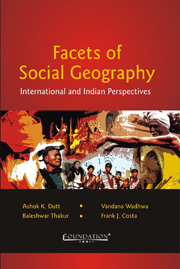Book contents
- Frontmatter
- Contents
- Foreword
- Preface
- Acknowledgements
- List of Contributors
- I Introductory Framework: Allen G. Noble's Contribution to Social Geography
- II Conceptual and Theoretical Basis of Social Geography
- 4 Social Geography: History, Structure and Reflections, with Special Reference to India
- 5 Methodological Developments in Social Geography
- 6 Geographies of Disability: An Emergent Theme in Social Geography
- 7 Geography and Personality of Region: The Context of Culture
- 8 Social Planning: A Spatial Perspective
- III Social Geography from a Global Perspective
- IV Social Geography in the Indian Context
- V Indian Social Geography: City and State Context
- Index
7 - Geography and Personality of Region: The Context of Culture
from II - Conceptual and Theoretical Basis of Social Geography
Published online by Cambridge University Press: 05 June 2012
- Frontmatter
- Contents
- Foreword
- Preface
- Acknowledgements
- List of Contributors
- I Introductory Framework: Allen G. Noble's Contribution to Social Geography
- II Conceptual and Theoretical Basis of Social Geography
- 4 Social Geography: History, Structure and Reflections, with Special Reference to India
- 5 Methodological Developments in Social Geography
- 6 Geographies of Disability: An Emergent Theme in Social Geography
- 7 Geography and Personality of Region: The Context of Culture
- 8 Social Planning: A Spatial Perspective
- III Social Geography from a Global Perspective
- IV Social Geography in the Indian Context
- V Indian Social Geography: City and State Context
- Index
Summary
As far back as the Stone Age, humankind has been inquisitive about its environment. Over a period people identified themselves with the land they occupied. With bounded lands they encountered elements created by nature and sooner or later, filled the area with elements they themselves created out of elements that existed independent of them. Geography as a formal discipline and an informal engagement, had, as its principal concern, the acquisition of knowledge and understanding of an identified and identifiable land area. Geography is always interested in evolving methods of exploring the land and creating an image of it.
These images, created through protracted encounters with the land and of real and perceived configurations, may be designated the personality of the region. Thus, the personality of a specific region can be conceptualized – firstly, through the perceptions of the inhabitants and their mode of living that has evolved to weave through the myriad moods of seasons and ecological subtleties such that the habitat can no longer be understood apart from the habits of the inhabitants, and secondly, through the interaction and synthesis in the minds of geographers, historians and archaeologists.
A Brief Overview of the Origins of Personality Studies of Regions
A survey of the extant literature on the theme clearly reveals two varieties of contributions. The first variety of research comprises a small section that is explicit in the use of the term ‘personality’ in their titles.
- Type
- Chapter
- Information
- Facets of Social GeographyInternational and Indian Perspectives, pp. 119 - 152Publisher: Foundation BooksPrint publication year: 2012



